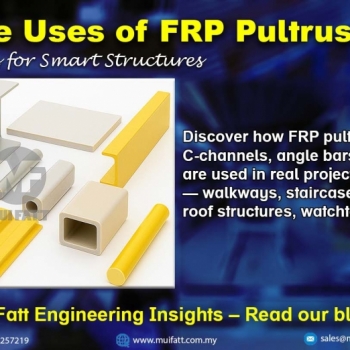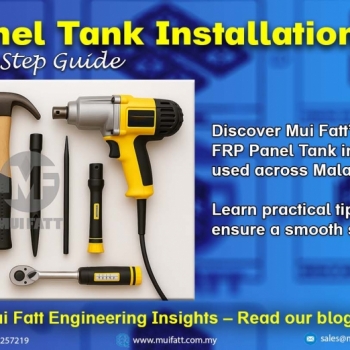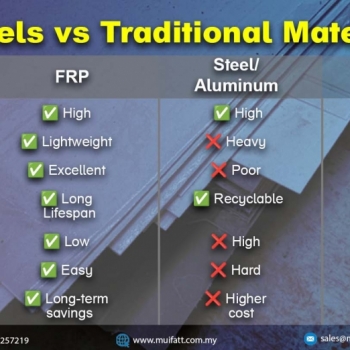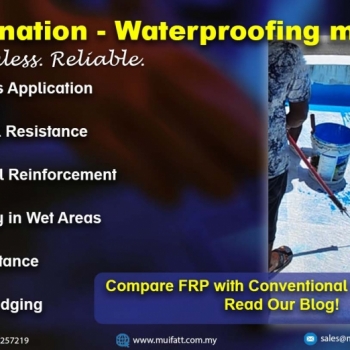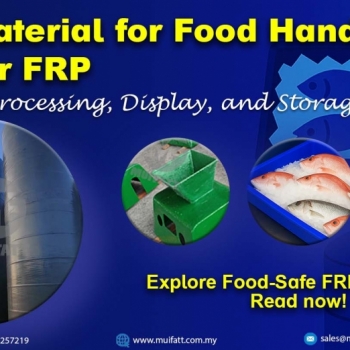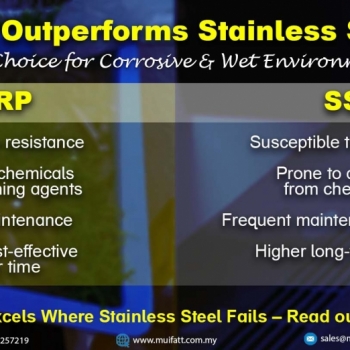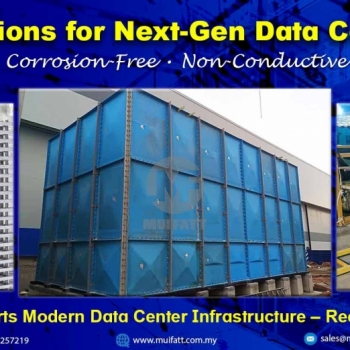FRP pultruded profiles are reshaping structural possibilities across Malaysia. From STP staircases to public park shelters, explore how these modular components enable custom FRP solutions—only from Mui Fatt.
Unlocking the Potential of FRP Grating: Advantages and Applications
30 May 2023
Grating is a lattice-shaped lid made of various materials, typically installed in a U-shaped ditch or similar structures. It serves as a strong, durable, and open surface that allows for the passage of air, light, and fluids, while also providing structural support. With its versatile applications, grating finds extensive use in a wide range of industries and sectors.
Grating is utilized in diverse applications, including industrial platforms, walkways, bridges, stair treads, drainage systems, mezzanines and catwalks, safety fencing, vehicle ramps and loading docks, screening and ventilation, as well as decorative purposes.
Grating materials can vary depending on the specific application and requirements. Common materials used for gratings include steel, aluminium, stainless steel, galvanized steel, cast iron, and Fiberglass-Reinforced Plastic (FRP). Among these materials, steel, particularly carbon steel (mild steel) and galvanized steel, has been widely utilized across various industries for many years.
Understanding Mild Steel Grating
 Mild steel grating refers to grating panels or structures fabricated using mild steel as the primary material. Mild steel, also known as carbon steel, contains a low carbon content, typically around 0.05% to 0.25% by weight. Its favourable properties and cost-effectiveness make it a popular choice. Grating panels are typically constructed by welding or joining individual steel bars or flat bars together in a grid pattern.
Mild steel grating refers to grating panels or structures fabricated using mild steel as the primary material. Mild steel, also known as carbon steel, contains a low carbon content, typically around 0.05% to 0.25% by weight. Its favourable properties and cost-effectiveness make it a popular choice. Grating panels are typically constructed by welding or joining individual steel bars or flat bars together in a grid pattern.
On the other hand, it is important to note that mild steel grating is susceptible to corrosion, especially when exposed to moisture or aggressive chemicals. To enhance its resistance to corrosion, mild steel grating can be galvanized. This process involves applying a protective zinc coating to the surface of the grating, offering improved durability and an extended lifespan (particularly in outdoor or corrosive environments), but will not eliminate corrosion issue.
What kind of material can mitigate the downsides of Mild Steel?
 The answer lies in Fiberglass-Reinforced Plastic (FRP)! FRP is not a new material in grating industry. It has been utilized for several decades across various industries and applications. FRP grating serves as a suitable alternative to mild steel grating and has gained popularity due to its unique properties and advantages over traditional materials such as steel, aluminium, or wood. Composed of a matrix of thermosetting resin reinforced with glass fibers, FRP grating is lightweight yet strong and durable.
The answer lies in Fiberglass-Reinforced Plastic (FRP)! FRP is not a new material in grating industry. It has been utilized for several decades across various industries and applications. FRP grating serves as a suitable alternative to mild steel grating and has gained popularity due to its unique properties and advantages over traditional materials such as steel, aluminium, or wood. Composed of a matrix of thermosetting resin reinforced with glass fibers, FRP grating is lightweight yet strong and durable.
Advantages of Fiberglass-Reinforced Plastic (FRP) Grating
Corrosion Resistance
FRP gratings are highly resistant to corrosion from chemicals, moisture, and harsh environments. Unlike steel, aluminium, or iron gratings, FRP does not rust, making it suitable for applications where corrosion is a concern, such as coastal areas or chemical processing plants. It offers a longer lifespan and lower maintenance requirements.
Chemical Resistance
FRP grating exhibits excellent resistance to a wide range of chemicals, including acids, alkalis, and solvents. It can withstand exposure to corrosive substances without deteriorating, making it ideal for industries dealing with chemicals or wastewater treatment.
High Strength-to-Weight Ratio
FRP gratings are lightweight while maintaining excellent strength. They provide comparable or even greater load-bearing capacity than traditional materials while being significantly lighter. This makes them easier to handle, transport, and install. This feature is particularly beneficial when weight limitations are a consideration.
Non-Conductivity
FRP gratings are non-conductive and electrically non-sparking. They do not conduct electricity, making them suitable for applications where electrical insulation is required, such as in electrical substations or areas with potential electrical hazards.
Low Maintenance
FRP gratings require minimal maintenance compared to materials like steel or wood. They do not require painting or periodic treatments to prevent corrosion, and they are less prone to degradation over time. Cleaning with mild detergents or water is usually sufficient to maintain their appearance and performance.
Slip Resistance
FRP gratings can be manufactured with a variety of surface patterns or coatings to enhance slip resistance, making them suitable for areas where slip hazards are a concern, such as walkways or platforms.
Due to these advantages, FRP gratings have found applications in industries such as marine, oil and gas, chemical processing, wastewater treatment, food processing, mining and metal processing, infrastructure and construction, and transportation. Its benefits and versatility continue to drive its increasing usage.
Additionally, FRP gratings do not have significant scrap value as compare to all kind of steel, FRP cannot be easily sold or recycled for monetary gain. Hence, they are less susceptible to theft issue, which is serious in steel.
The Common Applications of FRP Grating
Chemical Processing Plants
 FRP grating is extensively used in chemical processing plants, providing a corrosion-resistant platform for workers and equipment. It can withstand exposure to a wide range of chemicals and acids without degrading or corroding.
FRP grating is extensively used in chemical processing plants, providing a corrosion-resistant platform for workers and equipment. It can withstand exposure to a wide range of chemicals and acids without degrading or corroding.
Oil and Gas Industry
FRP grating is suitable for offshore platforms, oil refineries, and petrochemical plants due to its corrosion resistance and high strength-to-weight.
Marine and Coastal Structures
 FRP grating is used in marine and coastal applications such as docks, piers, bridges, and walkways. Its resistance to saltwater, UV rays, and harsh weather conditions makes it a durable and low-maintenance solution.
FRP grating is used in marine and coastal applications such as docks, piers, bridges, and walkways. Its resistance to saltwater, UV rays, and harsh weather conditions makes it a durable and low-maintenance solution.
Power Plants
FRP grating is used in power generation facilities, including thermal power plants, nuclear power plants, and renewable energy installations. It offers resistance to chemicals, heat, and electrical insulation.
Water and Wastewater Treatment Plants
 FRP grating is employed in water and wastewater treatment facilities, resisting corrosion from chemicals, sewage, and other corrosive elements commonly encountered in these environments.
FRP grating is employed in water and wastewater treatment facilities, resisting corrosion from chemicals, sewage, and other corrosive elements commonly encountered in these environments.
Mining and Metal Processing
FRP grating is utilized in mining operations and metal processing facilities, offering resistance to chemicals, high strength, and anti-slip properties.
Infrastructure and Construction
FRP grating can be used in various infrastructure and construction projects, such as pedestrian bridges, walkways, ramps, and platforms. It provides durability, lightweight, and corrosion resistance.
Food Processing Industry
 FRP grating finds application in the food processing industry, providing a safe and corrosion-resistant environment for platforms, walkways, and drainage systems.
FRP grating finds application in the food processing industry, providing a safe and corrosion-resistant environment for platforms, walkways, and drainage systems.
Transportation
FRP grating is used in transportation applications, including bus and train platforms, elevated walkways at airports, and pedestrian bridges, due to its lightweight nature and resistance to corrosion.
Conclusion
The versatility, corrosion resistance, durability, and other advantageous properties of FRP grating make it a popular choice in numerous industries and sectors where traditional materials like steel may not be suitable.
Talk to us for your project today! WhatsApp or email – sales@muifatt.com.my
We guarantee our expertise to you.
Visit our product page for more product details – FRP Gratings
Disclaimer:-
The information provided on this website is for general informational purposes only and does not constitute legal advice. While we strive to ensure the accuracy and reliability of the information provided, we make no representations or warranties of any kind, express or implied, about the completeness, accuracy, reliability, suitability, or availability concerning the information contained herein. Any reliance you place on such information is therefore strictly at your own risk. This website may contain links to other third-party websites. Such links are only for the convenience of the reader, user, or browser; which we do not warrant, recommend, endorse, or assume liability for the contents of the third-party sites.
Keep in touch with us should you be keen on receiving timely updates from us
- Website - https://www.muifatt.com.my/home/
- Facebook - https://www.facebook.com/muifattmarketing
- Instagram - https://www.instagram.com/muifattmarketing/
- Google - https://goo.gl/maps/WxVY13gNcaRTS7Jp6
- Youtube - http://www.youtube.com/@MuiFattMarketing
- TikTok - https://www.tiktok.com/@muifattmarketing
- LinkedIn - https://www.linkedin.com/company/mui-fatt-marketing-sdn-bhd-
- Linktree - https://linktr.ee/muifattmarketing
- Shopee - https://www.shopee.com.my/muifattmarketing
- Lazada - https://www.lazada.com.my/shop/mui-fatt-marketing
Recent Blog
Mui Fatt Engineering Insights - FRP Panel Tank Installation
Get to know the step-by-step assembly process of FRP sectional panel tanks, based on Mui Fatt’s industry-proven practices. This easy-to-digest guide is ideal for project managers, contractors, and technical personnel involved in water storage tank installation across Malaysia.
FRP Panels vs Traditional Alternatives: The Ultimate Guide to Durability and Sustainability
Explore why FRP (Fiberglass-Reinforced Plastic) panels outperform traditional materials like steel, plywood, and PVC in durability, sustainability, and cost-effectiveness. Discover real-world applications in MyKiosk projects and cold truck panel assembly, where FRP’s superior insulation, corrosion resistance, and lightweight properties deliver long-term benefits.
Comparing FRP Waterproofing with Traditional Systems
Is FRP lamination a better waterproofing method than traditional systems? Explore this complete guide with real project examples and see why FRP is gaining traction across Malaysia.
Benefits of FRP in Food Handling & Processing
With hygiene, durability, and corrosion resistance at its core, FRP (Fibreglass Reinforced Plastic) is becoming a preferred material in the food industry. This article explores why FRP is ideal for food handling equipment such as supermarket fish trays, water tanks, and food factory platforms, plus how Mui Fatt is delivering proven solutions through its successful FRP applications.
Mui Fatt Insights: Advanced Materials for Modern Needs
Is stainless steel the best for wet areas? This article explains why more industries are switching to FRP for its corrosion resistance, hygiene benefits, and longevity, especially in food displays and chemical exposure zones.
How FRP Supports Modern Data Center Infrastructure
Discover how fiberglass-reinforced plastic (FRP) is reshaping data center construction. Learn its key advantages, comparisons with other materials, and where to apply FRP—from rooftop chillers to cooling tanks.
Understanding FRP Filament Winding: Process, Benefits & Comparison
This article explores the FRP filament winding manufacturing method, how it differs from other FRP techniques, why it’s still widely used, and its long-term value for projects like high-strength tanks and cylinders.
